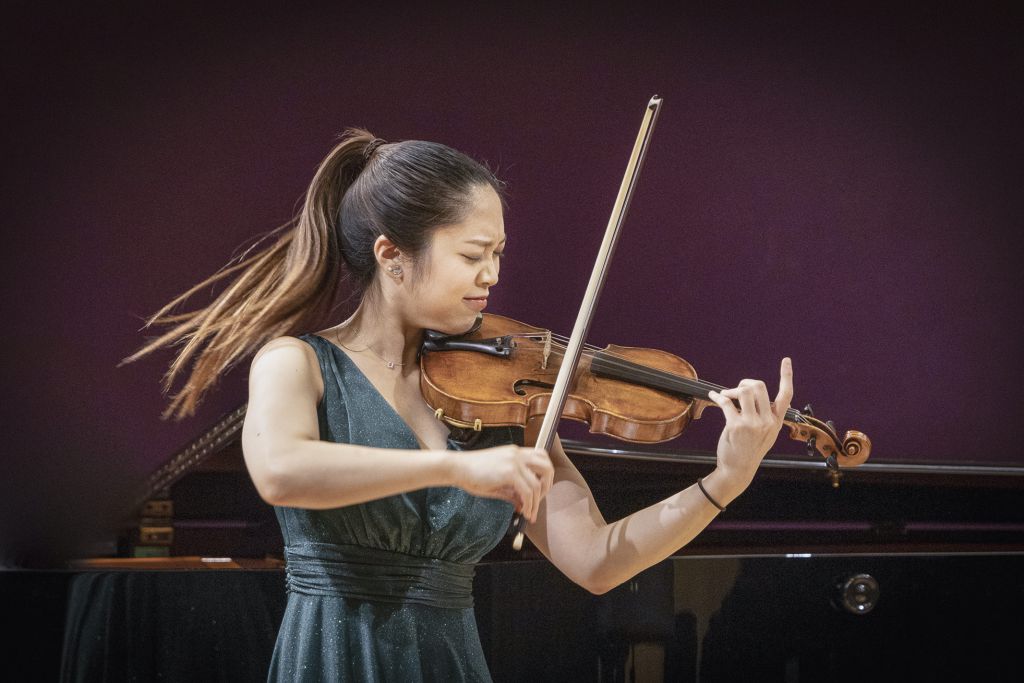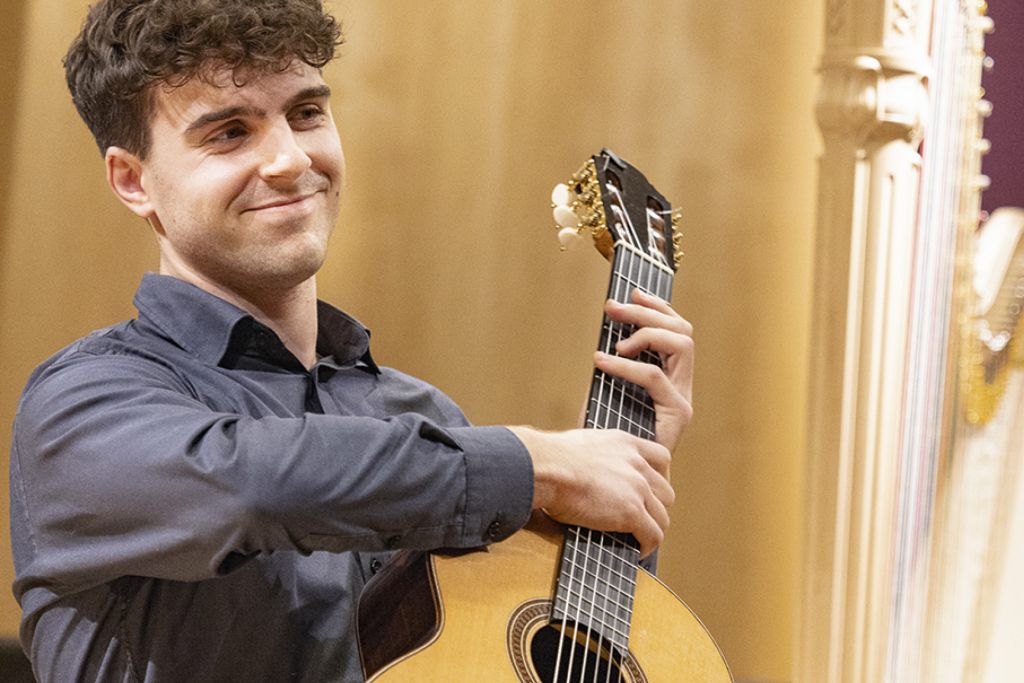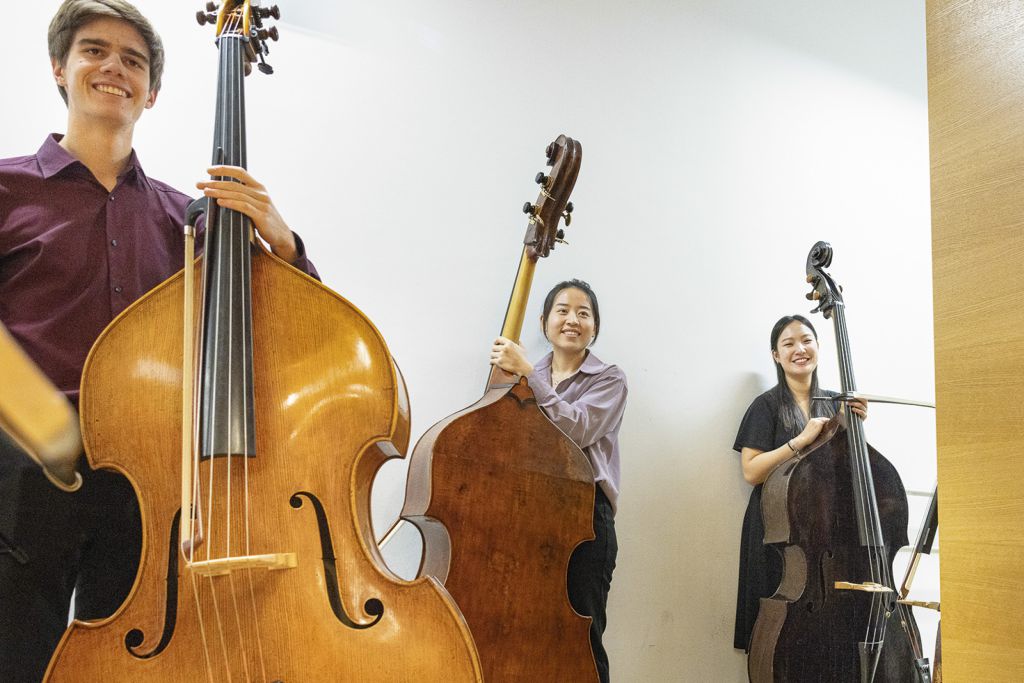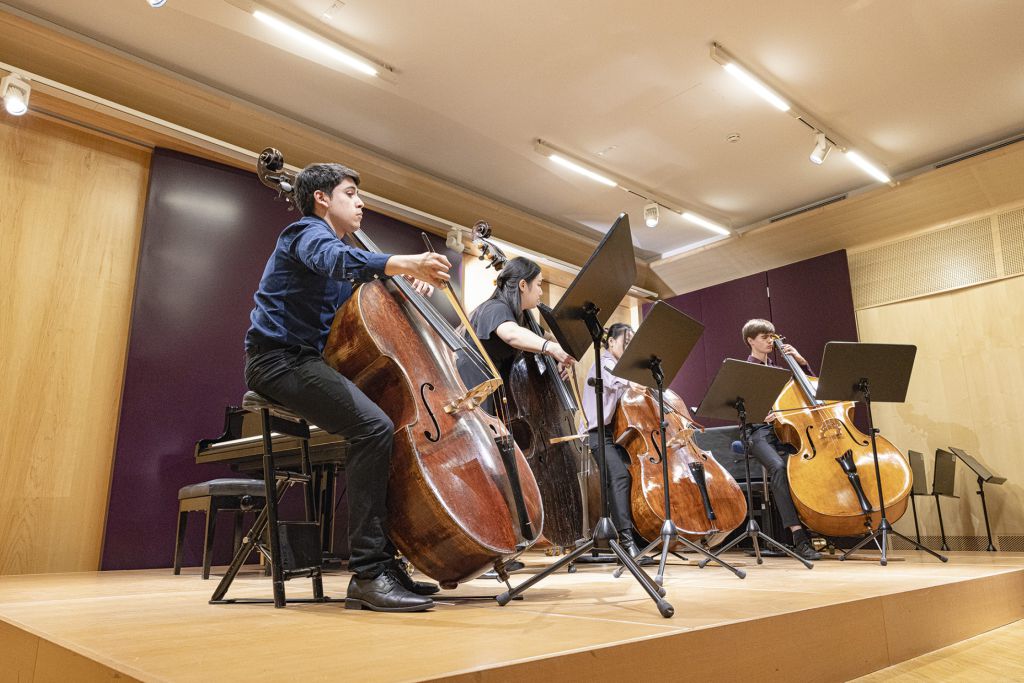On 21 November, the Fritz Kreisler Department’s biggest event in 2022—the More Strings Festival—concluded after five days. For both the audience and the participants, it had been a veritable marathon: eight concerts and two master classes plus academic lectures, workshops, and discussions had taken place, every single one of which contained an ocean of input, new ideas, and inspiration.

“We all want to make ‘good music’,” explains the festival’s initiator and artistic director Mirjam Schröder-Feldhoff. “But the question of what ‘good music-making’ entails today, how it’s learned, conveyed, and evaluated, is extremely complex and calls for continual discourse.” It was hence under the motto of “Knowledge – Exchange – Music” that all of the festival’s components, ranging from research to dialogue, practise, and presentation, were approached as selected aspects of good music-making:
- Practising right – in a workshop given by Claudia Schönauer
- The right material – in an explanatory presentation by string producer Thomastik-Infeld
- Historical performance practice – in a master class given by Gottlieb Wallisch
- Regional contextualisation – in the “Viennese sound” and the Wienerlied (Viennese song)
- The evaluability of musical achievement – in a lecture by Rosa Reitsamer
Thinking about “practising right” requires that one know something about the brain and body’s highly variable interactions, about neural networking, and about movement training. This is essential for the development of mental strategies that ease the interplay of information processing, body-awareness, and muscle movements. For the complex sequences of motions involved in music-making, the brain needs to form “solution packets” that it can trigger automatically in order to avoid overload. And in this light, the exercises introduced in Claudia Schönauer’s workshop can provide lasting benefits for one’s own practising.

Searching for “the right material” is a central concern of the string and product developers at Thomastik-Infeld. “Sound arises from physical processes,” according to Franz Klanner and Bernhard Rieger, explained string-instrument interactions using measurements of tone colour, volume, projection, and balance. What’s more, how new strings are put on, string tension, and the angles at which strings are strung upon the instrument are additional factors that one can alter in the interest of optimising sound and reducing wolf tones.
Good music requires an awareness of background information on the corresponding period and musical tradition. Accordingly, the master class by Gottlieb Wallisch (Berlin University of the Arts) revolved around playing music by Schubert on a fortepiano built in 1830. “Interpreting classical and early romantic piano works on the fortepiano affords the player astounding insights into compositions’ structure and makes clear the close relationship between works’ composition and the sounds that this type of instrument can produce,” explains Wallisch.
Schubert’s music arose within the specific context of the regional Viennese music tradition of his era, and the faculty concert aimed to render these relationships audible. Chamber music by Schubert was therefore performed in combination with traditional “Viennese songs”, with the “Viennese sound” of the latter effortlessly infecting the former. For the benefit of the general public, the fortepiano from 1830 was used for Schubert’s music.

Attracting new musicians and encouraging talents is an obvious responsibility of every generation that wants to keep its music alive. The festival’s “Violin Day” hence featured the debut of the cooperative project “Special Strings”. The point of this newly conceived cooperation between the Fritz Kreisler Department’s section of the mdw’s Programme for Gifted Children and Vienna’s Johann Sebastian Bach Music School is to offer talented young musicians an introduction and early access to the mdw. The project’s concert, held in the afternoon, featured 15 young talents aged eight and above from the Bach Music School and from the mdw’s Programme for Gifted Children in a most promising collaborative effort.
A further highlight of the festival was the prizewinners’ concert of the Stefanie Hohl Competition for violin students, a competition whose first two rounds had taken place in April. Here, Arevik Ivanyan, Sabina Islam, and Jiaqi Lu won over the jury with their renditions of the Sibelius Violin Concerto.
The question regarding the extent to which young musicians’ musical achievements can actually be evaluated is older than the modern-day “music competition”. On this topic, Rosa Reistamer and Rainer Prokop of the Department of Music Sociology introduced the findings of the QUART Study, which began investigating performance evaluations at German-speaking universities of music in 2015. Numerous actual criteria of those doing the evaluating are difficult to put into words, and some are also born of unconscious mechanisms. In this respect, the study also reveals instances of racism and of discrimination due to age and/or gender. And in the discussion round that ensued, the question regarding the extent to which “soft” evaluation criteria have a place in a neoliberalised society obsessed with quantifying everything in order to render it measurable remained quite present.

The participating violin students waxed universally enthusiastic about the multi-day masterclass given by Michaela Martin (Cologne University of Music). Also integrated into the festival was the inaugural concert by Margarita Escarpa, who succeeded Alvaro Pierri as a guitar professor in 2021. Furthermore, Christoph-Wimmer-Schenkel—a double bass professor since October 2022—performed Schubert’s Arpeggione Sonata in the faculty concert. Students of the Fritz Kreisler Department gave a further five concerts for stringed instruments, harp, and guitar that were well conceived and thoroughly worth listening to. And finally, music and instrument retailer Musikhaus Kerschbaum enriched the festival with its thematically adapted sales exhibitions.
Videos and Links
The faculty concert at the mdwMediahek:
www.mediathek.mdw.ac.at/morestrings22
Helpful tips on handling strings as well as on one’s first “DIY fixes” can be had at the website of Thomastik-Infeld:
www.thomastik-infeld.com/en/video-library

